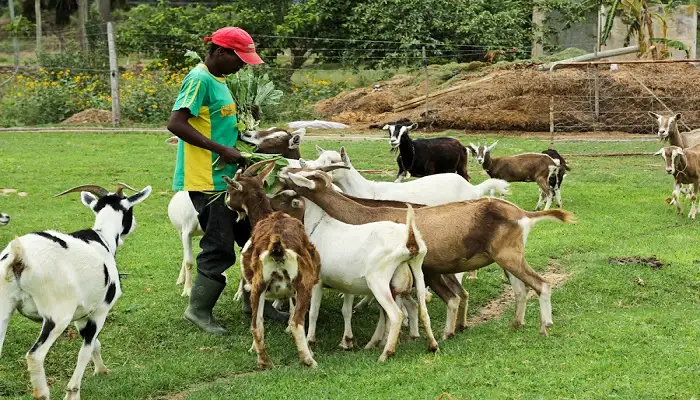 Aji Africa
Aji Africa
15 Oct 2025



15 Oct 2025
Goat farming is one of the most profitable and resilient livestock ventures in Nigeria. Goats are hardy animals that thrive in various ecological zones, require minimal capital compared to cattle or pigs, and provide multiple sources of income — including meat, milk, hides, and manure.
With the growing demand for goat meat (“chevon”) across Nigeria and beyond, investing in goat farming presents a golden opportunity for agripreneurs, youth, and smallholder farmers seeking sustainable income.
Nigeria has one of the largest goat populations in Africa, estimated at over 70 million heads, according to the National Bureau of Statistics. Most are reared under traditional smallholder systems, with goats roaming freely and feeding on available pasture or household waste.
However, this traditional approach limits productivity and profitability. With rising urbanization, population growth, and changing dietary preferences, there is increasing pressure to move from subsistence goat rearing to commercial goat production through organized farming and breeding.
Goat meat is a major part of Nigerian cuisine and is widely consumed across all regions and religions — unlike pork, which faces some restrictions. It is leaner, lower in cholesterol, and preferred for its unique flavor.
Demand peaks during festive periods such as Eid-el-Kabir, Christmas, weddings, and other celebrations.
Nigeria can take advantage of growing demand for goat meat and hides in neighboring countries and even the Middle East. Goat skins (leather) are also highly valued in the global fashion and footwear industries.
Goats adapt easily to different environments and feed on cheap, locally available materials such as grass, crop residues, and kitchen waste. This makes them cheaper to maintain compared to other livestock.
A female goat (doe) can give birth to two or more kids twice a year, allowing rapid herd multiplication and quick returns on investment.
Beyond meat, goats produce milk, manure (organic fertilizer), and leather — each of which can be monetized. Goat milk is gaining popularity for its digestibility and nutritional value.
Goats tolerate harsh weather conditions, disease, and drought better than many other livestock species, making them suitable for both northern and southern Nigeria.
Investments in goat farming can go beyond rearing to cover the entire value chain, such as:
Feed production: Cultivating pasture and producing formulated feed pellets.
Breeding services: Selling improved breeds like the Sahel, Red Sokoto, or Boer goats.
Meat processing: Slaughtering, packaging, and selling fresh or smoked goat meat.
Leather processing: Producing goat hides for export or local manufacturing.
Dairy production: Establishing small-scale goat milk and cheese businesses.
Each link in the chain offers significant profit potential.
Nigeria’s agricultural diversification policies now recognize goats as vital contributors to rural livelihoods.
The Livestock Productivity and Resilience Support (L-PRES) Project, supported by the World Bank, aims to improve goat and sheep production across several states.
Programs under the National Livestock Transformation Plan (NLTP) promote pasture development, improved breeding, and disease control.
Financial institutions like NIRSAL and Bank of Agriculture offer credit facilities for livestock enterprises, including goat farming.
These initiatives create a favorable environment for private investment.
While promising, investors must also understand and plan for key challenges:
Poor Breeding and Genetics: Most local breeds are low-yielding; improved breeding is needed for better meat or milk production.
Diseases and Parasites: Common infections like PPR (Peste des Petits Ruminants) and internal parasites can cause losses if preventive measures are ignored.
Lack of Structured Markets: Goat markets are still largely informal, leading to inconsistent prices.
Limited Veterinary Services: Access to animal health services and trained extension officers is often inadequate in rural areas.
Feed Scarcity During Dry Seasons: Goats depend on seasonal forage, making feed planning crucial.
Finance and Infrastructure Constraints: Small farmers struggle with access to land, loans, and storage facilities.
Feasibility Study: Assess market demand, target consumers, and production costs.
Choose the Right Breed: Popular Nigerian breeds include Red Sokoto, Sahel, and West African Dwarf. For faster growth and meat quality, Boer goats (exotic) can be introduced.
Housing and Space: Provide clean, dry, and well-ventilated housing to prevent disease.
Feeding and Nutrition: Combine grazing with supplementary feeding (hay, maize bran, legumes).
Health Management: Implement vaccination and deworming schedules. Maintain hygiene and biosecurity.
Record Keeping: Track births, weights, feed intake, and expenses to monitor performance.
Marketing Strategy: Sell directly to local markets, restaurants, or bulk buyers during festive seasons for higher returns.
Goat farming is one of the few livestock ventures where smallholders can start small and scale up profitably.
A modest investment of ₦500,000–₦1 million can start a 10–20 goat unit, with the potential to double herd size within a year.
Well-managed farms can achieve 30–50% profit margins, depending on feed and mortality rates.
With organized cooperatives, farmers can access loans, extension services, and bulk sales to improve profitability.
Experts estimate that Nigeria could earn over ₦300 billion annually from goat meat, milk, and leather if productivity gaps are closed.
Investments in goat farming in Nigeria represent a sustainable, inclusive, and profitable opportunity for both small-scale farmers and large investors. Goats’ resilience, fast reproduction, and strong local and export markets make them an ideal livestock investment in the country’s agricultural landscape.
To unlock the sector’s full potential, stakeholders must focus on improved breeding, disease control, feed development, and structured marketing. With coordinated government support, private investment, and farmer training, Nigeria can position itself as West Africa’s leading hub for goat production and export — driving food security, employment, and rural prosperity.
 your Money
your Money